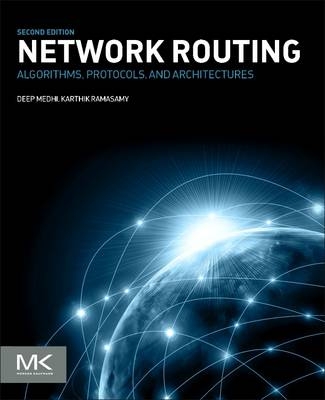
Network Routing
Morgan Kaufmann Publishers In (Verlag)
978-0-12-800737-2 (ISBN)
The book systematically considers these routing paradigms, as well as their interoperability, discussing how algorithms, protocols, analysis, and operational deployment impact these approaches and addressing both macro-state and micro-state in routing.
Readers will learn about the evolution of network routing, the role of IP and E.164 addressing and traffic engineering in routing, the impact on router and switching architectures and their design, deployment of network routing protocols, and lessons learned from implementation and operational experience. Numerous real-world examples bring the material alive.
Deep Medhi is Curators' Distinguished Professor in the Computer Science Electrical Engineering Department at the University of Missouri--Kansas City (UMKC), USA. Prior to joining UMKC in 1989, he was a member of the technical staff in the traffic network routing and design department at the AT&T Bell Laboratories. He is an honorary professor in the Computer Science & Engineering Department at the Indian Institute of Technology-Guwahati, India. He was an invited visiting professor at the Technical University of Denmark, a visiting research fellow at the Lund University, Sweden, a research visitor at Université Pierre et Marie Curie (UPMC), Paris, France, and a short-term visitor at Princeton University, Massachusetts Institute of Technology, and KTH Royal Institute of Technology, Sweden. He was also a Fulbright Senior Specialist. He was on the Brazilian Science Mobility Program with the University of Campinas, Brazil as his host institution. He serves as the editor-in-chief of Springer's Journal of Network & Systems Management, and is serving (or served) on the editorial board of IEEE Communications Surveys /& Tutorials, IEEE Transactions on Network and Service Management, IEEE/ACM Transactions on Networking, Computer Networks, Telecommunication Systems, and IEEE Communications Magazine. He has served on the technical program committees of numerous conferences including IEEE INFOCOM, IEEE ICNP, IEEE NOMS, IEEE IM, IEEE CloudNet, ITC, and DRCN, while serving as the Technical Program Co-Chair of DRCN 2009, IEEE NOMS 2010, IFIP Networking 2014, IEEE CloudNet 2016. He received his B.Sc.(Hons.) in Mathematics from Cotton College, Gauhati University, India, his M.Sc. in Mathematics from St.Stephens College, University of Delhi, India, and both his M.S. and Ph.D. in Computer Sciences from the University of Wisconsin--Madison, USA. He has published over one hundred and fifty peer-reviewed papers, and is co-author of Routing, Flow, and Capacity Design in Communication and Computer Networks, also published by Elsevier (2004). He is an IEEE Fellow. Karthik Ramasamy is co-founder of Streamlio and a teaching faculty member in the EECS Department at the University of California--Berkeley. He was an engineering manager for Real Time Analytics at Twitter. He is the co-creator of Twitter Heron and has more than two decades of experience working in parallel databases, big data infrastructure, and networking. He cofounded Locomatix, a company that specializes in real time streaming processing on Hadoop and Cassandra using SQL that was acquired by Twitter. Before Locomatix, he had a brief stint with Greenplum where he worked on parallel query scheduling. Greenplum was eventually acquired by EMC for more than /$300M. Prior to Greenplum, Karthik was at Juniper Networks where he designed and delivered platforms, protocols, databases, and high availability solutions for network routers that are widely deployed in the Internet. Before joining Juniper at UW Madison, he worked extensively in parallel database systems, query processing, scale out technologies, storage engine and online analytical systems. Much of this research was spun as a company later acquired by Teradata. He is the co-author of several publications and patents. He has a Ph.D. in Computer Science from the University of Wisconsin--Madison with a focus on data management, his M.S in Computer Science from the University of Missouri--Kansas City, and his B.E. (with distinction) in Computer Science and Engineering from Anna University, India.
Part I: Routing: Basics and Foundations1. Networking and Network Routing: An Introduction2. Routing Algorithms: Shortest Path, Widest Path, and Spanning Tree3. Routing Protocols: Framework and Principles4. Network Flow Models
Part II: Internet Routing5. IP Routing and Distance Vector Protocol Family6. OSPF and Integrated IS-IS7. IP Traffic Engineering8. Multicast Routing9. BGP10. Routing in the Global Internet11. Routing and Traffic Engineering in Software Defined Networks12. Routing in Data Center Networks
Part III: Router Architecture and Design13. Router Architectures14. IP Address Lookup Algorithms15. IP Packet Filtering and Classification16. Switch Fabric17. Packet Queueing and Scheduling18. Traffic Conditioning
Part IV: Routing in Reservation-Oriented Networks19. Circuit-Switching: Hierarchical and Dynamic Call Routing20. Traffic Engineering for Circuit-Switched Networks21. Quality of Service Routing22. MPLS and GMPLS23. Routing and Traffic Engineering using MPLS24. Routing in Optical Networks, Multilayer Networks, and Overlay Networks25. Call Routing in GSTN26. VoIP Call Routing
| Erscheinungsdatum | 08.12.2017 |
|---|---|
| Reihe/Serie | The Morgan Kaufmann Series in Networking |
| Verlagsort | San Francisco |
| Sprache | englisch |
| Maße | 191 x 235 mm |
| Gewicht | 2080 g |
| Themenwelt | Mathematik / Informatik ► Informatik ► Netzwerke |
| Technik ► Nachrichtentechnik | |
| ISBN-10 | 0-12-800737-0 / 0128007370 |
| ISBN-13 | 978-0-12-800737-2 / 9780128007372 |
| Zustand | Neuware |
| Haben Sie eine Frage zum Produkt? |
aus dem Bereich


